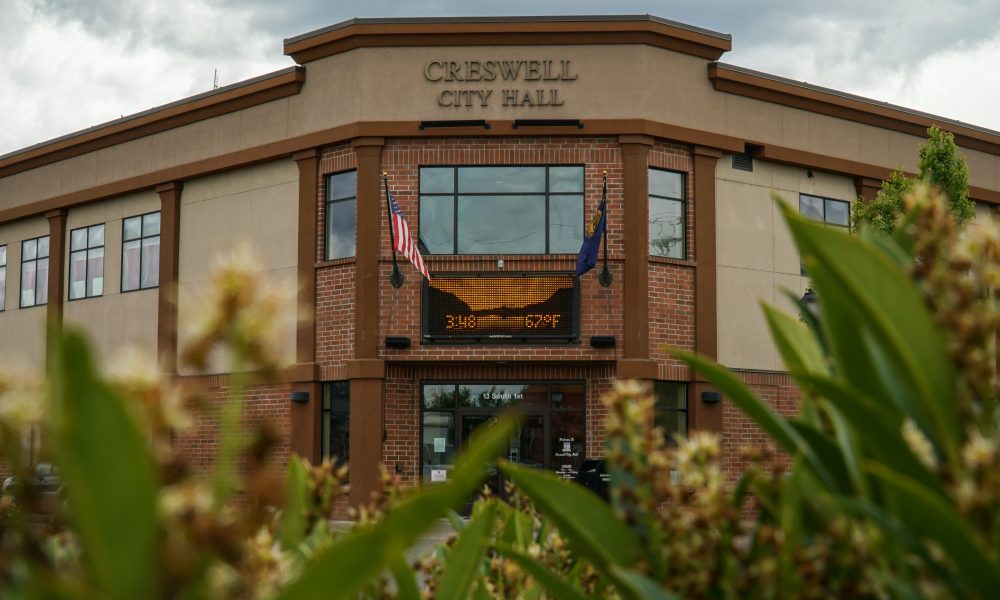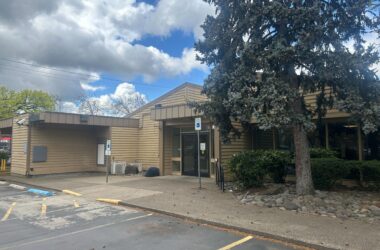CRESWELL – It all boils down to time, place, and manner.
Creswell City Council this week spent four hours working toward coming into compliance with a federal court ruling that states that cities cannot enforce anti-camping ordinances if they do not have enough homeless shelter beds for their homeless population.
In a city with an average unhoused population between six and 10 and no support services available, the City must come into compliance with federal and state law by July or risk being sued.
Under the Eighth Amendment, the courts have ruled that criminalizing homelessness is unconstitutional if there is no available alternative for people to sleep.
For Creswell, and for all cities in Oregon, that means designating a time, place, and manner for the unhoused.
During a council meeting earlier this month, council discussed the option of designating Garden Lake Park as a safe site for the unhoused to sleep, but after hefty public comment and pushback, the option to designate Garden Lake Park was briskly taken off the table for further consideration.
Instead, Mayor Dave Stram organized the meeting to allow each councilor to list potential locations for consideration, followed by public input. The robust, hours-long discussion ultimately boiled down to two options for consideration: The City will either vote to designate the South First Street Pocket Park as a safe site for the unhoused to sleep, or it will vote simply to not designate any space at all and risk being out of compliance.
Both ordinances are being drafted for council vote at its June meeting.
***
City Attorney Ross Williamson refers to two rulings for council to consider: Martin v. Boise and Blake v. Grants Pass, now known as Johnson v. Grants Pass.
Martin v. Boise is a 2018 landmark decision by the United States Court of Appeals for the Ninth
Circuit Court that centered around a challenge to an ordinance in Boise, Idaho, that criminalized sleeping or camping in public places.
The plaintiffs argued that the ordinance violated their Eighth Amendment rights, which prohibit cruel and unusual punishment, as it effectively criminalized homelessness and punished individuals for engaging in necessary life-sustaining activities such as sleeping.
The court ultimately ruled that the ordinance was unconstitutional.
Creswell’s current camping regulations are essentially identical to the Boise regulations that were found to be unconstitutional.
In a similar fashion to Martin v. Boise, Johnson v. Grants Pass is a 2019 ruling that centers around the city’s enforcement of an ordinance that prohibited camping in public places within city limits. Michael Blake was cited and fined for violating the ordinance after he set up a campsite in a city park, and challenged the citation in court.
In July 2020, a federal judge ruled in favor of Blake, finding that the city’s enforcement of the camping ordinance violated the Eighth Amendment and reinforced the idea that criminalizing homelessness is unconstitutional.
Designating a place means that the City can direct the unhoused to a space to sleep overnight. Designating manners and times means that regulations can be drafted and enforced.
***
Councilors Nick Smith, Tammy Su Schuck and Staci Holt dug their heels in during the meeting, adamant that they will not vote to designate a place.
“No place anywhere, ever,” Schuck said.
“No place whatsoever in Creswell,” Smith said.
“I am 100% against designating a place,” Holt said.
Not designating a space for the unhoused to sleep is not “objectively unreasonable, and would put the City at risk of being sued, according Williamson.
Councilors Schuck, Smith, and Holt said that in their discussions with community members, the community is not in favor of designating a spot.
“I am not going to vote ‘yes’ on any place that we make comfortable and accommodating to individuals that we need to move along,” Schuck said.
But within the confines of time, place, and manner, the unhoused have “the right to be” in Creswell; to not have a space that allows them a safe, dry place to sleep is deemed unconstitutional by the courts, Williamson said.
“There’s got to be some place where someone can sleep. It doesn’t have to be comfortable. Technically that could be a sidewalk. It could be a parking lot – just somewhere in the city where someone can sleep overnight,” he said.
Michelle Amberg, city manager, clarified that this would not be a “homeless camp” but rather a “sleep site” with limitations on hours and rules to follow while on the property.
Councilor Holt suggested that the council remove the language in the City’s ordinance that calls for a camping fine while still prohibiting camping, essentially regulating the time and manner without designating a space.
Williamson said that course of action would give police no teeth for regulation or enforcement.
“If there is no punishment for a violation there’s nothing to enforce. A violation goes hand-in-hand with prohibition,” Williamson said. “If you clear off the violation, you would be allowing camping.”
Amberg said that by not designating a space for them to sleep, the City would not be allowing the unhoused “the right to be,” and that is a reflection of what happened in Boise.
“If you go without designating a place and we put in place all these rules, where will be the place where they can be? That is the question it comes down to,” Amberg said. “I’m just trying to follow the law … I am trying to prevent the city from spending hundreds of thousands of dollars in lawsuits.”
Williamson said that he can draft the ordinance, but it would not be strongly defensible.
“I don’t know how I would defend that ordinance,” he said.
Stram said that there is a perception among council and the community that “if you build it, they will come.”
“I’m not looking to invite the homeless but I’m looking to acknowledge that they’re part of our life. They’re part of our community,” Stram said. “How do we provide a safe place for unhoused neighbors? How do we comply with the law? I would never vote for an ordinance that says we provide no place because I think that’s both uncharitable and at the same time, I think it’s a blatant violation of the law.”
***
If council were to come into compliance with the law and designate a space, Williamson said it could dictate the manner and time in which the unhoused are on that specified property. The City can heavily regulate where that is, when it is, and how that is.
The South First Street Pocket Park was created about 10 years ago across the street from City Hall. It has overhead cover, a bench, picnic table, trash can, and restroom, and is already frequented by the unhoused.
Councilors in support argued that the space is visible, in close proximity to police and emergency services, and is a big enough space to accommodate the small unhoused population in its current state. Others argued that the location would put area businesses at risk of loitering or vandalism, and that City staff could be put at risk when working late.
However, tightening up regulations would give police more leverage for arrests and removal in the designated space, like requiring that sleepers come and go by certain hours, keeping pets leashed, disallowing smoking or drug use of any kind, designating small spaces for sleep, and prohibiting mattresses or sleeping structures.
“This property would allow us to have more control of the situation,” said Norma Jean Osborn, councilor.
Williamson is drafting up two ordinances for council vote at the June 12 council meeting. The council will decide whether to designate a location for the unhoused to be able to sleep legally, or will vote to not designate a place at all.







